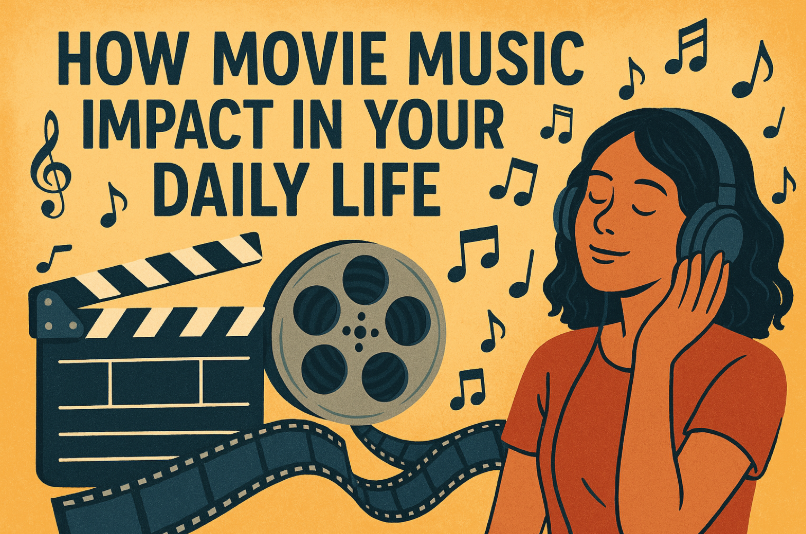Have you ever walked out of a movie theater feeling completely different than when you walked in? Maybe you felt pumped up after watching an action movie, or sad after a drama. While we often credit the story or acting, there’s another powerful force at work: the music.
Movie music does something remarkable to our brains. It doesn’t just make scenes more dramatic – it actually changes how we feel, think, and behave long after we leave the theater.
Your Brain on Movie Music
When you hear music in a film, your brain responds immediately. It’s not just “nice background noise.” The music triggers real chemical reactions in your head.
Happy music releases dopamine, the same chemical that makes you feel good when you eat chocolate or get a text from someone you like. Scary music floods your system with adrenaline, making your heart beat faster even though you’re just sitting in a chair.
This happens because music connects directly to the oldest parts of our brains – the parts that control emotions and survival instincts. That’s why a simple melody can make you cry, or why creepy music makes you tense up even when nothing scary is happening on screen.
Why Certain Songs Make You Think of Specific Movies
Think about the song “My Heart Will Go On” from Titanic. Even if you hear it in a grocery store, you probably think about that movie. Your brain has created a permanent link between that song and those emotions.
This happens because our brains are designed to remember things that come with strong emotions. When you watch a movie, the music becomes part of the memory. Later, hearing that music brings back not just the movie, but all the feelings you had while watching it.
Scientists call this “emotional memory.” It’s the same reason certain smells remind you of your childhood, or why a particular song takes you back to high school. Your brain packages the music together with the experience.
How Movies Train Your Emotions?
Movie composers know exactly what they’re doing. They use specific musical tricks to make you feel certain ways:
Violins playing high notes usually mean something romantic or beautiful is happening. Low, rumbling sounds signal danger. Fast drums create excitement and energy.
Over time, your brain learns these patterns. You don’t consciously think “high violins mean romance.” You just feel romantic when you hear them, even outside of movies.
This training is so strong that many people can’t hear the Jaws theme song without feeling nervous – even in a swimming pool. The music has taught your brain that this sound means danger, even when there’s no shark around.
Movie Music in Your Daily Life
Here’s where it gets really interesting. Movie music doesn’t stay in the theater. It follows you home and influences your daily mood in ways you might not realize.
Many people listen to movie soundtracks while working out. The music from Rocky or superhero movies actually makes you feel stronger and more motivated. Your brain remembers the excitement and determination from those movies and applies it to your workout.
Students often study to film music because certain soundtracks help them focus. The ambient music from sci-fi movies creates a sense of calm concentration. Some people even listen to horror movie music when they need to stay alert and focused.
Even during relaxing moments – whether you’re unwinding at home, enjoying a break with an iget bar plus, or just taking time to decompress – the right movie soundtrack can instantly shift your mood from stressed to peaceful.
The Power of Musical Memory
Movie music creates shared experiences across entire cultures. Almost everyone knows the Star Wars theme or the Harry Potter music. These songs become part of our collective emotional language.
When a new superhero movie uses similar musical styles to classic hero themes, your brain automatically understands: “This is a hero story. Feel excited and hopeful.” The music communicates meaning without words.
This is why certain songs become “your song” with friends or romantic partners. The music connects you to shared emotional experiences and memories.
Soundtracks as Emotional Tools
Smart people have figured out how to use movie music as a tool for managing emotions. Here are some common ways:
Morning motivation: Epic adventure soundtracks help people feel energized to start their day.
Workout intensity: Action movie music makes exercise feel easier and more exciting.
Focus and productivity: Certain ambient film scores help people concentrate at work or while studying.
Relaxation: Gentle, emotional soundtracks help people unwind and de-stress.
Confidence building: Hero theme music can actually make you feel more confident in challenging situations.
The Technology Factor
Streaming services and smartphones have changed everything. You can now carry thousands of movie soundtracks with you everywhere. This means movie music influences your mood throughout the day, not just during movies.
Playlist algorithms on Spotify and Apple Music have learned that people respond strongly to film music. They often recommend movie soundtracks based on your mood or activity, knowing these songs are designed to trigger specific emotional responses.
Why This Matters?
Understanding how movie music affects you gives you more control over your emotions and experiences. If you know that certain music makes you feel confident, you can use it before job interviews or important presentations. If you know what music helps you relax, you can use it to manage stress.
Movie music also helps explain why we get so attached to certain films and why some movies stay with us for years. It’s not just the story – it’s the way the music made us feel and continues to make us feel every time we hear it.
The Bigger Picture
Movie music proves something important about humans: we’re deeply emotional creatures who respond powerfully to sound and rhythm. This isn’t a weakness – it’s one of our greatest strengths. Music helps us connect with stories, with each other, and with our own emotions in ways that words alone can’t achieve.
The next time you find yourself humming a movie theme or feeling unexpectedly emotional when you hear a familiar film song, remember that you’re experiencing something remarkable. Your brain is accessing a carefully crafted emotional memory, connecting you to stories and feelings that have become part of who you are.
Movie music doesn’t just score films – it scores our lives, creating an emotional soundtrack that influences our moods, memories, and experiences long after the credits roll. That’s the real magic of cinema: it doesn’t just tell us stories, it gives us the music to feel them forever.



